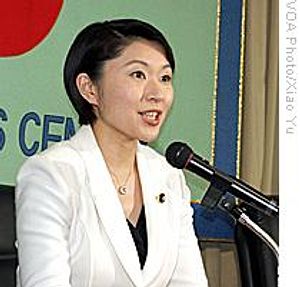An emerging political scandal surrounding Japanese Prime Minister Shinzo Abe’s Cabinet has moved with surprising speed over the weekend. The issue started with Economy, Trade and Industry Minister Yuko Obuchi, who reportedly failed to account for funds used for her supporters in 2010 and 2011 to attend plays at the Meijiza theater, totaling some 26 million yen ($242,000). She told a committee meeting of the Diet’s lower chamber on Friday that “It’s not enough just to say that I didn’t know about it,” and by Monday she had formally handed in her resignation to Abe. There is also now considerable expectation that Justice Minister Midori Matsushima will also resign, after a member of the opposition brought a criminal complaint against her in the Tokyo District Court on Friday, claiming she broke an electoral law by distributing paper fans to her constituency during summer festivals.
The surprising pace of these issues shows two things: The opposition’s desire to discredit the new Abe Cabinet, which has enjoyed large public support in no small part due to the inclusion of a record five female members, and the ruling government’s own desire to move past these scandals as quickly as possible. According to the Kyodo News, a source close to Abe on Sunday said “we should not prolong this problem,” while an LDP executive said “Unless Matsushima steps down, things will not cool down.”
Indeed, there do appear to already be political consequences, as a Kyodo News poll over the weekend saw the Cabinet’s approval rating fall 6.8 percent from a month ago, to 48.1 percent. More importantly for the government, opposition to the upcoming consumption tax increase was at 65.9 percent, with 84.8 percent saying they did not believe the economy had recovered.
Additionally troubling for Abe is the fact that Obuchi had been given a difficult and high-profile portfolio, which included the government’s initiative to begin restarting the country’s nuclear reactors. Abe had no doubt hoped that Obuchi’s popularity as one of the new female Cabinet members would help in moving this process along. Yet, this weekend’s poll showed that 60.2 percent of the population is still opposed to a nuclear restart.
If Matsushima follows Obuchi in resigning, this will be a huge blow to Abe’s “Womenomics” initiative, which seeks to promote leadership roles for women in both the public and private sectors. Even as the Cabinet approved on Friday legislation that would mandate female hiring targets for companies with 301 or more employees, Abe’s enthusiasm for boosting the profile of his female hiring initiative at the expense of a thorough vetting of his own Cabinet members could backfire, at least in the short-term. What is potentially more problematic is whether or not the opposition is targeting, or seen as targeting, these new women ministers. In order to actually change the structure of corporate Japan and its government to include a greater role for women, ideas and initiatives like Abe’s will need to survive long after the current administration.

































